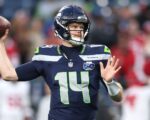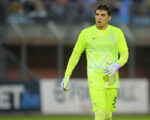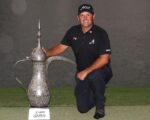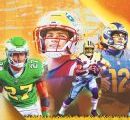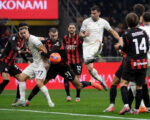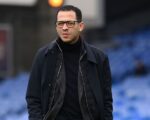The hot stove season is already burning, but even amid the jostling of 2026 rosters, we’ve one last bit of 2025 business: handing out the major awards.
The biggies are the four major honors determined by BBWAA voting. These are the ones that will generate the most future attention in baseball history books and on Hall of Fame résumés of the future. The schedule (awards will be announced starting at 7 p.m. ET each night on MLB Network):
Today: Jackie Robinson Rookies of the Year
Tuesday: Managers of the Year
Wednesday: Cy Young Awards
Thursday: MVP Awards
In addition, MLB will hold its annual awards show in Las Vegas on Thursday, during which it will recognize its All-MLB squads, the Hank Aaron Awards for each league’s best offensive performer, the Comeback Player of the Year Awards, the Mariano Rivera/Trevor Hoffman Awards for the top relievers, and the Edgar Martinez Awards for best designated hitters. The Executive of the Year Award will also be announced.
I’ll be reacting to each night’s awards announcement throughout the week, but in the meantime, here are some opening comments, as well as some brief reaction to the honors that have already been doled out.
Below, we list the three finalists in each of the big four categories, with what you need to know before the results are announced, and my picks to take home the hardware. We’ll update each section with news and analysis as the awards are handed out.
Jump to:
MVP: AL | NL
Cy Young: AL | NL
Rookie of the Year: AL | NL
Manager of the Year: AL | NL

American League MVP
Aaron Judge, New York Yankees
Cal Raleigh, Seattle Mariners
Jose Ramirez, Cleveland Guardians
My pick: Raleigh
What to know: We’re going to dive deep into the riveting race between Judge and Raleigh later this week. According to my AXE rating, which is an index that expresses the consensus of the leading bottom-line metrics, the winner is Judge (164 to 150) and it’s not particularly close.
Despite the easy statistical case for Judge, I see this as a case in which the narrative and intangible elements overwhelm the metrics. And that’s not to undersell Raleigh’s metrics, which are more than MVP-worthy. But despite another historic season from Judge, I’m going with Raleigh.
Facing Judge »
Again, we’ll get into the nitty gritty of the numbers later, but the soft factors that swing my thinking are these: Raleigh’s 60-homer season is the stuff of science fiction when viewed through the lens of what’s expected from every-day catchers. It not only shattered the single-season mark for the position, but it broke Mickey Mantle’s record for homers by a switch-hitter. Mickey freaking Mantle. And Raleigh’s a (darn good) catcher!
Finally, Raleigh did all of this as the defensive anchor and clubhouse leader on a division champion. There aren’t many seasons when I’d pick someone as MVP over the 2025 version of Aaron Judge, but this is one of them. Sure, I’m a stat guy, so this feels like a departure from that foundation, but sometimes a narrative is just too compelling to ignore.
Finally, poor Jose Ramirez. This is Ramirez’s sixth time landing in the AL’s top five in MVP balloting, and eighth time in the top 10. But he’s not going to win. Ramirez just keeps churning out the same great season every year. It’s just that there has always been someone a little greater each season.
That being said: Kansas City’s Bobby Witt Jr. should have been the third finalist. He’ll be back.
MVP must-reads:
What it’s really like facing Aaron Judge
Can Yankees build a title-winning team around Aaron Judge?
‘It’s something that’s never been done’: Inside Cal Raleigh’s road to HR history
Why the Mariners are built to last after a crushing ALCS loss
National League MVP
Shohei Ohtani, Los Angeles Dodgers
Kyle Schwarber, Philadelphia Phillies
Juan Soto, New York Mets
My pick: Ohtani
What to know: Together, the three NL MVP finalists logged 63% of their starts at designated hitter. Most of the non-DH starts came from Soto, whose defensive metrics continue to suggest a future of increased DH time. Still, the days of DHs being locked out of the MVP chase are clearly over.
Ohtani was the first exclusive DH to win an MVP last year, though he’d won it before while serving as an every-day DH in addition to pitching. He logged 1.1 bWAR this season for his 47 innings on the mound, which could have proved to be a tiebreaker if he and the other finalists were close. But it’s Ohtani all the way.
Geraldo Perdomo (7.0 bWAR), though he did finish behind Ohtani when the latter’s pitching bWAR is added.
MVP must-reads:
2025 MLB most exciting player bracket: Ohtani, Judge, more
The improbability of Shohei Ohtani’s greatness
Schwarber, All-Star swing-off captures the beauty of baseball
Inside Juan Soto’s wild first Mets season
Juan Soto, the showman, finally showing up for Mets
‘He turned his back on us’: What it was like watching Soto’s Bronx return with the Bleacher Creatures

American League Cy Young
Hunter Brown, Houston Astros
Garrett Crochet, Boston Red Sox
Tarik Skubal, Detroit Tigers
My pick: Skubal
Skubal is well positioned to become the AL’s first repeat Cy Young winner since Pedro Martinez in 2000. He might just be getting started. The dominant lefty didn’t repeat as a pitching Triple Crown winner, but he posted a lower ERA (2.21 to 2.39) and struck out more batters (241 to 228) than he did while winning the Cy Young Award in 2024. For the second straight year, he led the AL in pitching bWAR, FIP and ERA+.
Jesse Rogers »
That’s a tough résumé for Crochet to top, but he came pretty close, leading the AL in innings (205⅓), strikeouts (255) and beating Skubal in wins (18 to 13). Skubal was a little more consistent in terms of average game score (64.2 to 62.6). Skubal really didn’t rout Crochet in any key area, but he beat him just the same in most columns.
Brown is a worthy No. 3, but for him, it’s the same story: He hung with the Big 2 in most areas, but didn’t top them. Still, it was another season of improvement for Brown, whose ERA over the past three seasons has gone from 5.09 to 3.49 to 2.43.
Cy Young must-reads:
The extraordinary mystery of the Tigers’ Tarik Skubal
National League Cy Young
Cristopher Sanchez, Philadelphia Phillies
Paul Skenes, Pittsburgh Pirates
Yoshinobu Yamamoto, Los Angeles Dodgers
My pick: Sanchez
My AXE system wasn’t particularly emphatic about the No. 3 pitcher in the NL Cy Young column, so Yamamoto is as good a pick there as any. We start with him because his dominant postseason run is fresh in our minds. But that doesn’t factor in here. Maybe it should, but it doesn’t. In any event, I’d have gone with Milwaukee’s Freddy Peralta as my No. 3.
Regardless of the third finalist, during the regular season, Skenes and Sanchez gradually separated themselves from the pack, especially after Sanchez’s teammate Zack Wheeler was injured. They are the easy top two but picking between them isn’t that easy.
Bracket »
Sanchez has the edge in volume — 202 innings to 187⅔, in part because the Pirates eased up on Skenes toward the end. Indeed, failure to do so would have been malpractice. Despite that, Skenes struck out more batters (216 to 212), posted a better ERA (1.97 to 2.50) and led the league in ERA+, WHIP and FIP. The extra 14⅓ innings allowed Sanchez a narrow win in bWAR (8.0 to 7.7).
In the end, their runs saved against average is a virtual dead heat: 53 for Sanchez against 52 for Skenes. Thus for me it comes down to context. Sanchez put up his season for a division champ; Skenes for a cellar dweller. That is not Skenes’ fault, but we’ve got to separate these pitchers somehow. Sanchez’s season was worth 3.2% championship probability added against Skenes’ 0.5%. That’s the clincher for me.
But I think Skenes will win the vote.
Cy Young must-reads:
How young aces Skenes, Skubal dominate

American League Rookie of the Year
Roman Anthony, Boston Red Sox
Nick Kurtz, Athletics
Jacob Wilson, Athletics
My pick: Kurtz
Kurtz wins this one in an AXE rout and, presumably, will do the same in the voting. It might have been different had Anthony’s season not ended on Sept. 2 because of an oblique injury, but that’s what happened.
Kurtz’s rookie season was amazing and historic. He didn’t break camp with the A’s and didn’t debut until April 23. He failed to homer during his first 16 big league games, slugging just .327 over that span. Then he found his power stroke. Boy did he.
Rankings, contract projections »
After that acclimation period, Kurtz slugged 36 homers in 101 games, a pace of nearly 58 per 162 games. His slash line was .293/.392/.660 during that span. That early, low slugging percentage ended up at .619, the third-highest ever for a rookie with at least 480 plate appearances.
Quick sidebar: I know everybody love’s Kurtz’s Big Amish nickname, but can’t we go with Colonel? Because Colonel Kurtz promises to be a horror for pitchers for a long time to come.
Wilson was the early front-runner but faded during the second half despite continuing to swing at everything — and making contact with everything.
ROY must-reads:
Passan Awards: Nick Kurtz wins ‘Individual Performance of the Year’
How a swing tweak has Red Sox rookie Roman Anthony rolling
National League Rookie of the Year
Drake Baldwin, Atlanta Braves
Caleb Durbin, Milwaukee Brewers
Cade Horton, Chicago Cubs
My pick: Baldwin
The NL rookie race is somewhat less dynamic than it was in 2024 when the finalists were Skenes, Jackson Merrill and Jackson Chourio. The 2025 race was such a hodgepodge all season that, in the end, it feels almost miraculous that AXE agrees with the voters’ selection of the three finalists.
As an excellent-hitting rookie who got into 97 games as a catcher, Baldwin has the clearest case for the award. Durbin was a spark plug for the Brewers who does a little bit of everything, but he was roughly a league-average hitter. Horton was excellent for the Cubs but logged only 118 innings.
Baldwin caught, played 124 games and put up a 126 OPS+ while driving in 80 runs. That’s enough separation for me.

American League Manager of the Year
Toronto Blue Jays
Stephen Vogt, Cleveland Guardians
Dan Wilson, Seattle Mariners
My pick: Schneider
Schneider’s style of game management generates a lot of critiques. But he still guided a team from last place to an AL East title and a World Series appearance, though the voters wouldn’t have known about that last part. He also oversaw a makeover of the team’s offensive approach that led to one of baseball’s most prolific attacks. And if you want to assign the credit for the improvement of the hitters to coach David Popkins, fine. But who hired him?
Manager of the Year must-reads:
How the high-contact, high-octane Blue Jays nearly took down a baseball superpower — and could change MLB
The magic chemistry of the Blue Jays clubhouse
How Mariners got their mojo
National League Manager of the Year
Cincinnati Reds
Pat Murphy, Milwaukee Brewers
Rob Thompson, Philadelphia Phillies
My pick: Murphy
This would make Murphy 2-for-2 in winning the award as a full-time big league manager, a position he didn’t ascend to until age 65. (I’m discounting his 96-game interim stint for San Diego in 2015.)
Yes, the Brewers repeated as a playoff team, but this was still a squad that entered the season with low expectations after the roster was shuffled into an even younger version. Rather than this being a transition season, the Brewers were one of baseball’s most exciting units. They won close games, won with rookies and won with a relatively low payroll. And they had a tremendous clubhouse culture
It’s a combination of factors that should enable Murphy to repeat, especially because the voters didn’t know Milwaukee would eventually be flattened by the Dodgers in the NLCS.
Manager of the Year must-reads:
Welcome to ‘Milwaukee Community College’: How the Brewers built a $115 million juggernaut
Why Terry Francona, Bruce Bochy came back to managing in MLB

Other awards
Just a run-through of my picks, leaving aside the Comeback Player category, which is tough to attack analytically:
Executive of the Year: Matt Arnold, Milwaukee Brewers. I have a metric I use to track organizational performance. It looks at things like the performance of acquired players, organizational records and the value produced by rookies. Arnold’s club topped the charts. Arnold won this award last year, so we’ll find out if there is an Arnold fatigue at work here. If Arnold doesn’t win, I’d lean toward Seattle’s Jerry Dipoto.
All-MLB: My All-MVP first team, courtesy of AXE:
1B: Matt Olson, Atlanta Braves
2B: Nico Hoerner, Chicago Cubs
SS: Bobby Witt Jr., Kansas City Royals
3B: Jose Ramirez, Cleveland Guardians
C: Cal Raleigh, Seattle Mariners
OF: Juan Soto, New York Mets
OF: Aaron Judge, New York Yankees
OF: Corbin Carroll, Arizona Diamondbacks
DH: Shohei Ohtani, Los Angeles Dodgers
LHP: Tarik Skubal, Detroit Tigers
RHP: Paul Skenes, Pittsburgh Pirates
RP: Aroldis Chapman, Boston Red Sox
Hank Aaron Award: Aaron Judge (AL, New York Yankees); Shohei Ohtani (NL, Los Angeles Dodgers)
Mariano Rivera Award: Aroldis Chapman, Boston Red Sox
Trevor Hoffman Award: Edwin Diaz, New York Mets
Gold Gloves: The winners have been announced and can be found here. My quibbles: I would have gone with Toronto’s Alejandro Kirk at AL catcher over Detroit’s Dillon Dingler. On the NL side, I’d have liked to find a spot for Washington’s Jacob Young, but the insistence on LF/CF/RF distinctions ruled that out. All in all, another pretty solid job in an awards category that used to be rife with absurdities.


